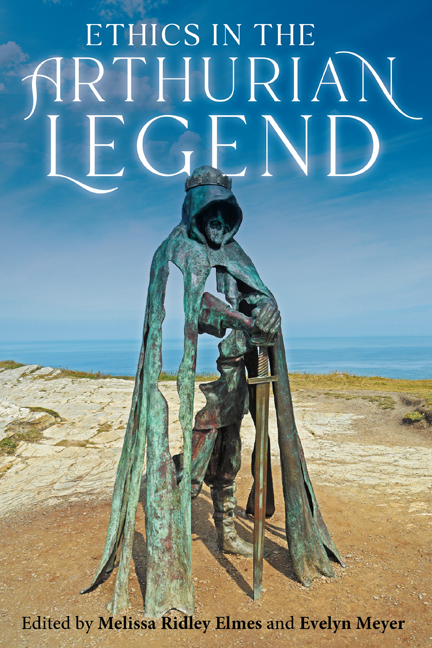Book contents
- Frontmatter
- Contents
- List of Contributors
- Foreword
- Acknowledgments
- Introduction
- 1 Arthurian Ethics before the Pentecostal Oath: In Search of Ethical Origins in Culhwch and Olwen
- 2 Too Quickly or Not Quickly Enough, Too Rash and Too Harshly: The Arthurian Court’s Lack of Ethics in Hartmann von Aue’s Erec and Iwein and Wolfram von Eschenbach’s Parzival
- 3 The Ethics of Arthurian Marriage: Husband vs Wife in Hartmann von Aue’s Iwein
- 4 Arthurian Ethics and Ethical Reading in the Perlesvaus
- 5 Translation Praxis and the Ethical Value of Chivalry in the Caligula Brut
- 6 Imperial Ambitions and the Ethics of Power: Gender, Race, and the Riddarasögur
- 7 Lowland Ethics in the Arthur of the Dutch
- 8 Contesting Royal Power: The Ethics of Good Lordship, Sir Gawain and the Green Knight, and the March of Wales
- 9 “As egir as any lyoun”: The Ethics of Knight-Horse Relationships in Lybeaus Desconus
- 10 Malory’s Ethical Dinadan: Moderate Masculinity in a Crisis of Hypermasculine Chivalry
- 11 Virtus, Vertues, and Gender: Cultivating a Chivalric Habitus in Thomas Malory’s Tale of Sir Gareth
- 12 Kingly Disguise and (Im)Perception in Three Fifteenth- Century English Romances
- 13 “Adventure? What is That?” Arthurian Ethics in/and the Games We Play
- 14 The Ethics of a New Edition of Sir Thomas Malory’s Le Morte Darthur – and More Evidence for the Superiority of the Winchester Manuscript
- 15 The Ethics of Writing Guinevere in Modern Historical Fiction
- Afterword
- Index
14 - The Ethics of a New Edition of Sir Thomas Malory’s Le Morte Darthur – and More Evidence for the Superiority of the Winchester Manuscript
Published online by Cambridge University Press: 10 January 2024
- Frontmatter
- Contents
- List of Contributors
- Foreword
- Acknowledgments
- Introduction
- 1 Arthurian Ethics before the Pentecostal Oath: In Search of Ethical Origins in Culhwch and Olwen
- 2 Too Quickly or Not Quickly Enough, Too Rash and Too Harshly: The Arthurian Court’s Lack of Ethics in Hartmann von Aue’s Erec and Iwein and Wolfram von Eschenbach’s Parzival
- 3 The Ethics of Arthurian Marriage: Husband vs Wife in Hartmann von Aue’s Iwein
- 4 Arthurian Ethics and Ethical Reading in the Perlesvaus
- 5 Translation Praxis and the Ethical Value of Chivalry in the Caligula Brut
- 6 Imperial Ambitions and the Ethics of Power: Gender, Race, and the Riddarasögur
- 7 Lowland Ethics in the Arthur of the Dutch
- 8 Contesting Royal Power: The Ethics of Good Lordship, Sir Gawain and the Green Knight, and the March of Wales
- 9 “As egir as any lyoun”: The Ethics of Knight-Horse Relationships in Lybeaus Desconus
- 10 Malory’s Ethical Dinadan: Moderate Masculinity in a Crisis of Hypermasculine Chivalry
- 11 Virtus, Vertues, and Gender: Cultivating a Chivalric Habitus in Thomas Malory’s Tale of Sir Gareth
- 12 Kingly Disguise and (Im)Perception in Three Fifteenth- Century English Romances
- 13 “Adventure? What is That?” Arthurian Ethics in/and the Games We Play
- 14 The Ethics of a New Edition of Sir Thomas Malory’s Le Morte Darthur – and More Evidence for the Superiority of the Winchester Manuscript
- 15 The Ethics of Writing Guinevere in Modern Historical Fiction
- Afterword
- Index
Summary
One of the merits of this volume on Arthurian ethics is its acknowledgment of the variety of ethical issues present in the Arthurian corpus. Individual Arthurian texts can have fundamentally different underlying moral philosophies. To take a representative example, the French Queste del Saint Graal (c. 1215–30) reflects monastic Christian values. As a result, the Quest proper begins with a prohibition against excessive intermingling of men and women, and it turns out there is an equally strong prohibition throughout the Quest against excessive bloodshed. Lancelot gets into trouble on both counts: his custom of fighting and inflicting serious, blood-drawing physical damage upon others to enhance his own earthly reputation no longer brings him glory when measured against the strict Christian values of the Grail Quest, and his love affair with the queen disqualifies him from coming too near the holy object that is the goal of this new quest. In contrast to La Queste, the non-cyclic prose Lancelot (early thirteenth century) – even more than its cyclic counterpart – reflects courtly values in celebrating both knightly prowess and earthly love. This text valorizes Lancelot and Guenievre's adulterous affair, making it clear that Lancelot's love saves Arthur's kingdom and Guenievre's life and concluding with the queen's public declaration of her justified love for Lancelot. These two thirteenthcentury French texts illustrate how Lancelot, as a literary character, changes with each ethical standard by which he is measured, from the time of his twelfth-century creation by Chrétien de Troyes in Le Chevalier de la Charrette (Lancelot) through to his last medieval appearance in Sir Thomas Malory's fifteenth-century Le Morte Darthur. Indeed, during this period Lancelot becomes an ethical conundrum: “at once the loyal servant, the loyal lover, and the supreme traitor.” As the examples of the French Queste and the non-cyclic Lancelot reveal, each author takes a different approach to the issue of Lancelot's ethical standing in order to suit the hero to the text and contexts he inhabits. Sir Thomas Malory downplays the treachery of Launcelot's affair with Gwenyvere as much as he can, even going so far as to present both lovers – like their counterparts Trystram and Isode – as sympathetically as possible, even when they get caught together in the queen's bedroom.
- Type
- Chapter
- Information
- Ethics in the Arthurian Legend , pp. 325 - 356Publisher: Boydell & BrewerPrint publication year: 2023



